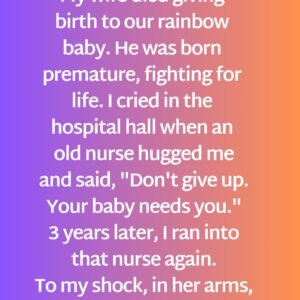My son died in an accident when he was sixteen, and from the moment the doctor said the words no parent should ever hear, my world split open. The hospital walls felt too bright, too clean, too quiet for a reality that violent. I collapsed into grief so heavy I could barely breathe. And beside me stood my husband, Sam—still, expressionless, unmoved. Not a single tear. Not a single crack in his voice.
At first, I told myself he was in shock. People react differently, I reminded myself. Some scream, some collapse, some go numb. But as the days unfolded—days filled with planning a funeral no parent wants to plan, signing papers no parent wants to sign, facing family members with shattered faces—Sam remained frozen.
At the funeral, I sobbed so hard I could barely stand. Friends held me upright while the casket lowered into the ground. Sam remained rigid, jaw tight, staring straight ahead like he was carved from stone. Not once did he reach for my hand.
That was the beginning of the end.
Back home, the silence was unbearable. Our house, once warm with teenage noise and slammed doors and music from upstairs, felt like a tomb. I needed Sam to grieve with me, to share some piece of the agony so I wouldn’t drown in it alone. But he became a ghost inside his own life. He slept little, spoke less, and wrapped himself in work as if staying busy could erase what happened.
I tried to reach him—softly at first, then desperately. Every attempt hit a wall. He wouldn’t talk about our son. Wouldn’t talk about the accident. Wouldn’t talk about his feelings. Wouldn’t talk about mine.
“You don’t even care,” I accused him once. I’m not proud of that moment, but pain can make you cruel.
He didn’t yell. He didn’t defend himself. He just looked at me with eyes I couldn’t read and walked out of the room.
Resentment grew between us like roots cracking concrete. Eventually we couldn’t hold the marriage together. We divorced quietly, like two strangers who’d run out of reasons to keep trying.
Sam remarried a few years later. His new wife, Mara, seemed gentle, patient, maybe even the kind of woman who knew how to live with someone who stayed locked away emotionally. I didn’t envy her, but I hoped she got a version of him I never received.
I moved to a smaller town, rebuilt in fragments, learned how to live with the grief instead of fighting it. Twelve long years passed. Twelve years of birthdays with an empty chair, holidays cut in half, and the quiet ache that never fully leaves.
Then Sam died. Unexpectedly. Sudden. A heart attack, they said. He was gone before help arrived.
The news knocked the breath out of me—not with the sharp pain of losing my son, but with a deep, hollow sadness. Sam had been a part of my story for decades, even if we ended badly. I went to the funeral, watched people who knew him in the last chapter of his life mourn him, and realized how distant we had become.
A few days after the funeral, Mara showed up at my doorstep. I hadn’t expected to see her again, and the guilt in her eyes immediately put me on edge. She held a thermos of coffee in both hands as if she needed something to keep her grounded.
“Thank you for seeing me,” she said quietly.
We sat at my kitchen table, the same one where I used to braid my son’s hair before school, where I used to wait for him to come home. Mara held her cup with trembling fingers.




